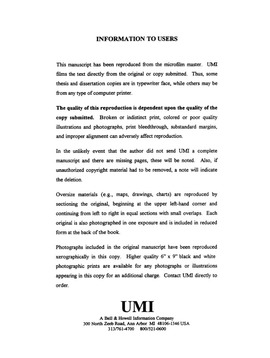| dc.contributor.advisor | Griswold, Robert L., | en_US |
| dc.contributor.author | Janda, Robert Lance. | en_US |
| dc.date.accessioned | 2013-08-16T12:30:05Z | |
| dc.date.available | 2013-08-16T12:30:05Z | |
| dc.date.issued | 1998 | en_US |
| dc.identifier.uri | https://hdl.handle.net/11244/5662 | |
| dc.description.abstract | When the first women cadets entered the United States Military Academy in 1976, they were harbingers of massive changes at West Point and within the American Army. They arrived on the heels of the anti-militarism of the 1960s and 70s, defeat in Vietnam, the end of the draft, and a decay of the armed forces in general. They were despised by many cadets and members of the Academy staff and faculty who feared the end of male dominance at West Point. By the time sixty two of the original one hundred nineteen women graduated in 1980 they had endured harassment, assault, and vicious hazing from many male cadets in an environment where Academy officials often implicitly or explicitly condoned such behavior. | en_US |
| dc.description.abstract | This dissertation examines how and why women were admitted to West Point in 1976, how they changed and were changed by the institution, and what the timing of their admission says about the Army and the America of the 1970s. It addresses the question of how society constructs gender, how the interaction of men and women at West Point represents in microcosm the gender problems plaguing society, and whether the military is the proper forum for promoting social and cultural change. Patterns of male resistance to women in institutions held sacred by men are discussed in detail, along with societal assumptions about the body, the chasm that sometimes exists between equity and equality, and the truth that for the Army gender is more problematic than race. Finally, it examines the experiences of the first group of women at West Point, detailing their personal battles and victories, and assessing how far gender integration at the Academy progressed by 1980. It concludes that the pattern of harassment against women at West Point reflected deeply-rooted sexism within the military and American culture, and that while the assimilation of women into the Corps of Cadets was only partially complete when the first women graduated, their admission still paved the way for greater acceptance of women at the Academy and in the military overall during the 1980s. | en_US |
| dc.format.extent | xxx, 280 leaves ; | en_US |
| dc.subject | United States Military Academy. | en_US |
| dc.subject | History, United States. | en_US |
| dc.subject | Women and the military. | en_US |
| dc.subject | Women Education (Higher) New York (State) West Point. | en_US |
| dc.subject | Education, History of. | en_US |
| dc.subject | Women's Studies. | en_US |
| dc.title | Stronger than custom: West Point and the admission of women, 1972-1980. | en_US |
| dc.type | Thesis | en_US |
| dc.thesis.degree | Ph.D. | en_US |
| dc.thesis.degreeDiscipline | Department of History | en_US |
| dc.note | Source: Dissertation Abstracts International, Volume: 59-07, Section: A, page: 2398. | en_US |
| dc.note | Director: Robert L. Griswold. | en_US |
| ou.identifier | (UMI)AAI9839796 | en_US |
| ou.group | College of Arts and Sciences::Department of History | |
